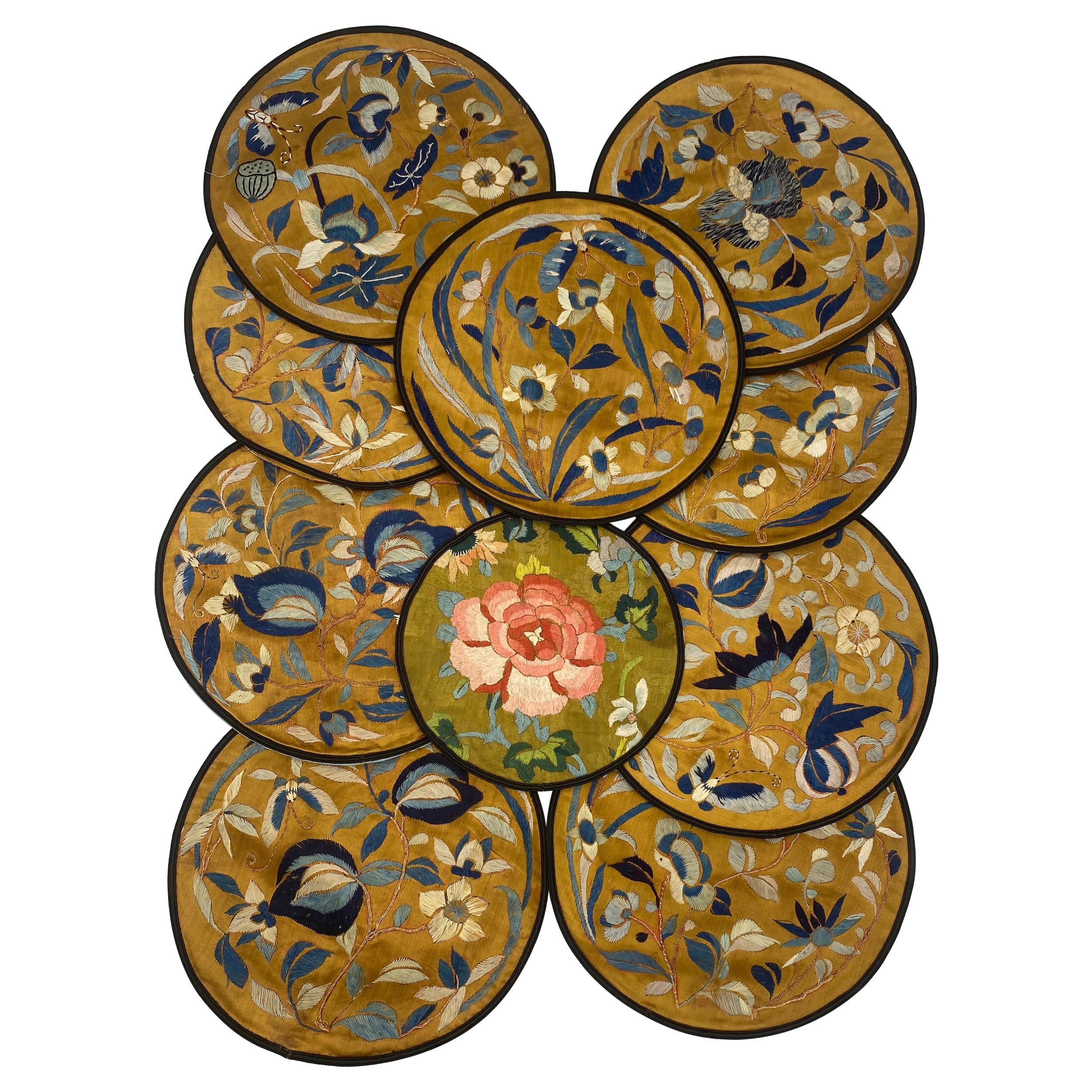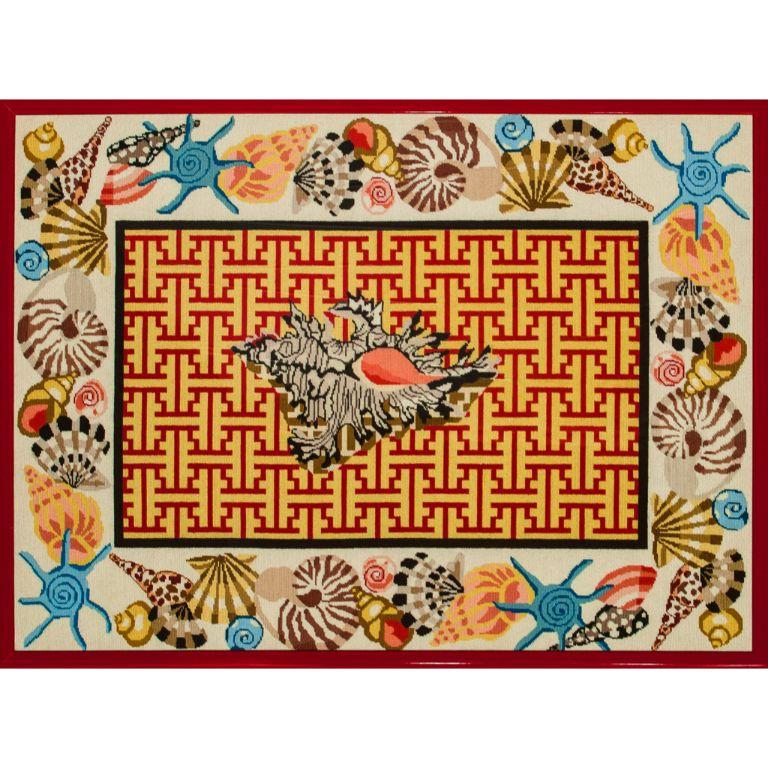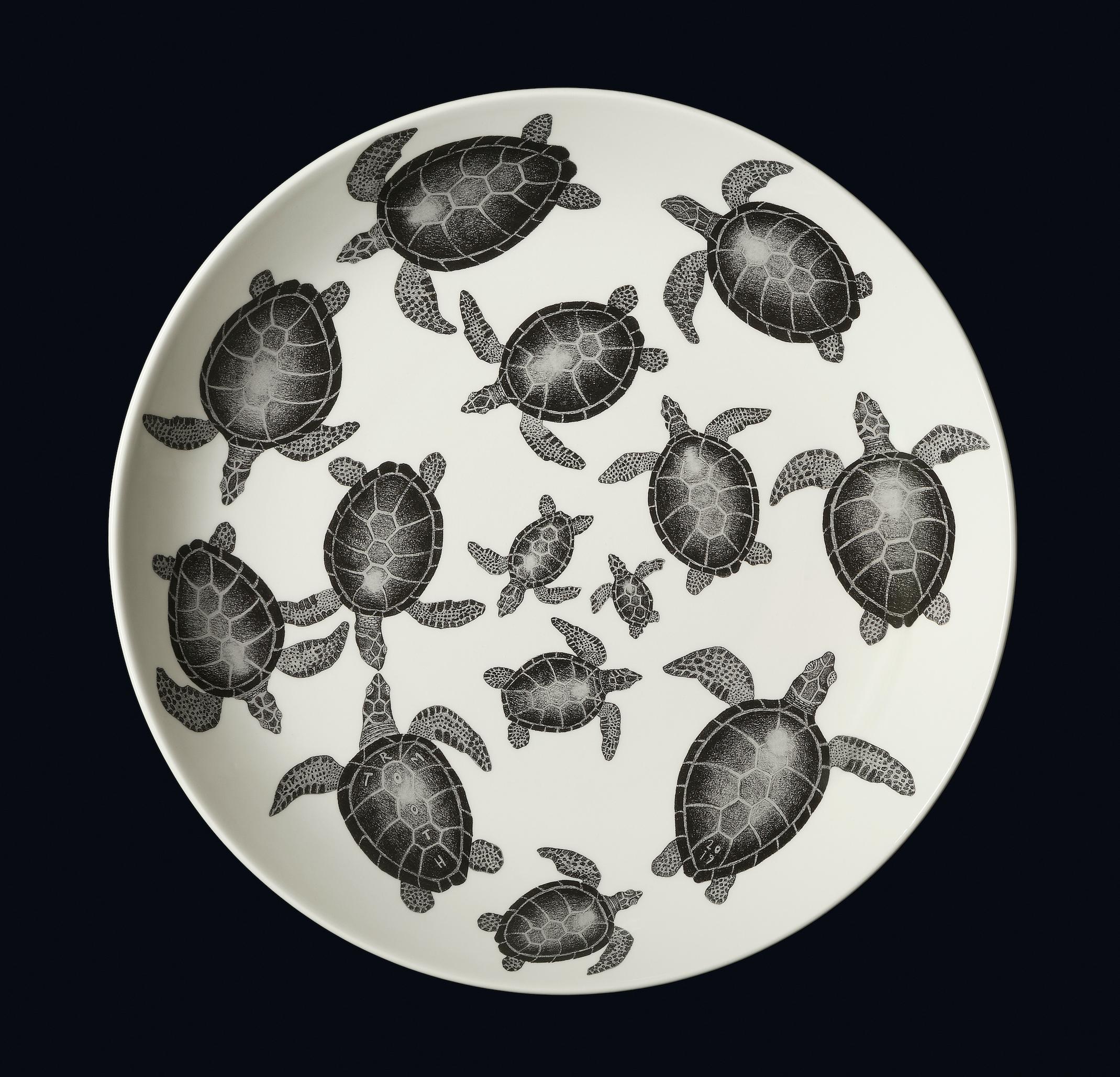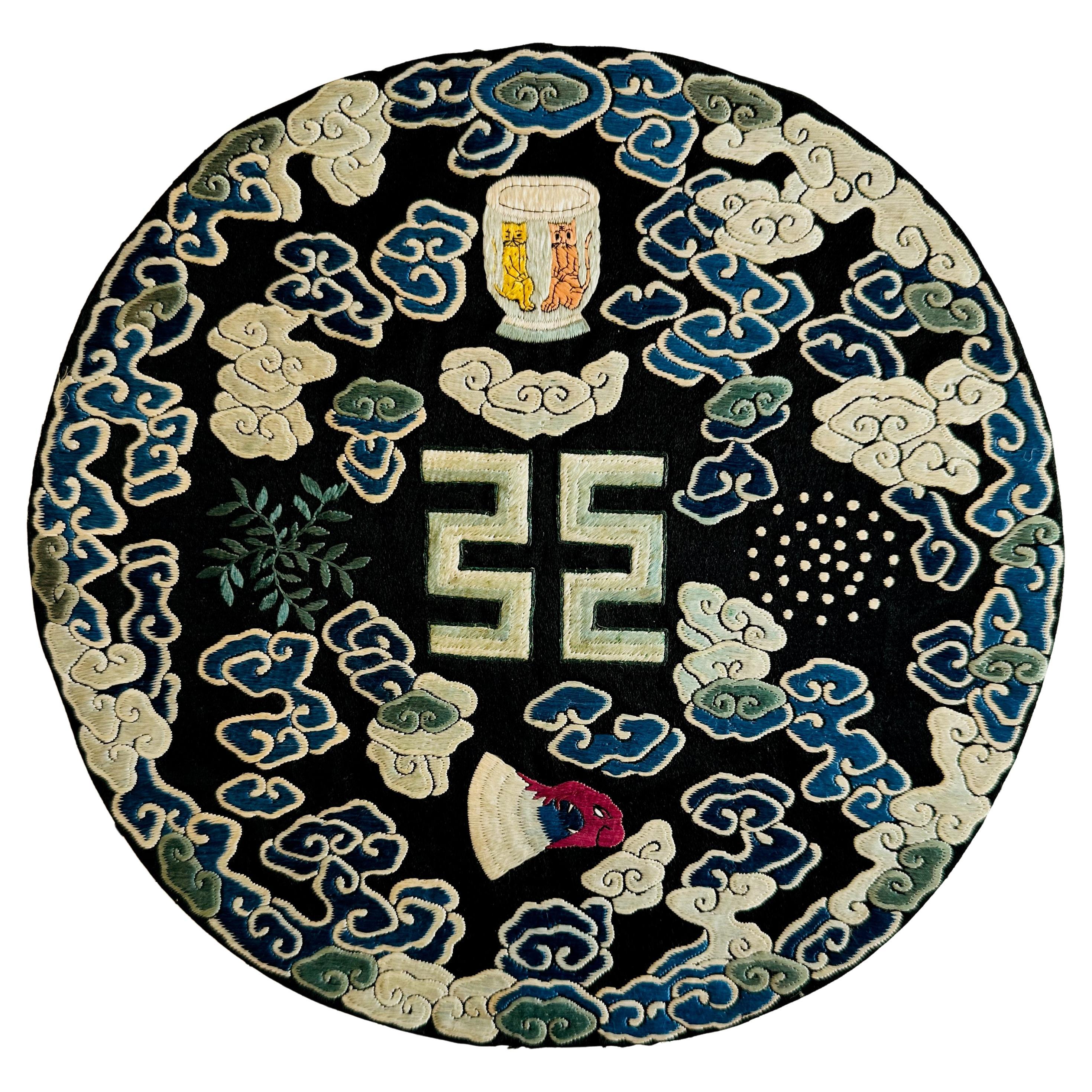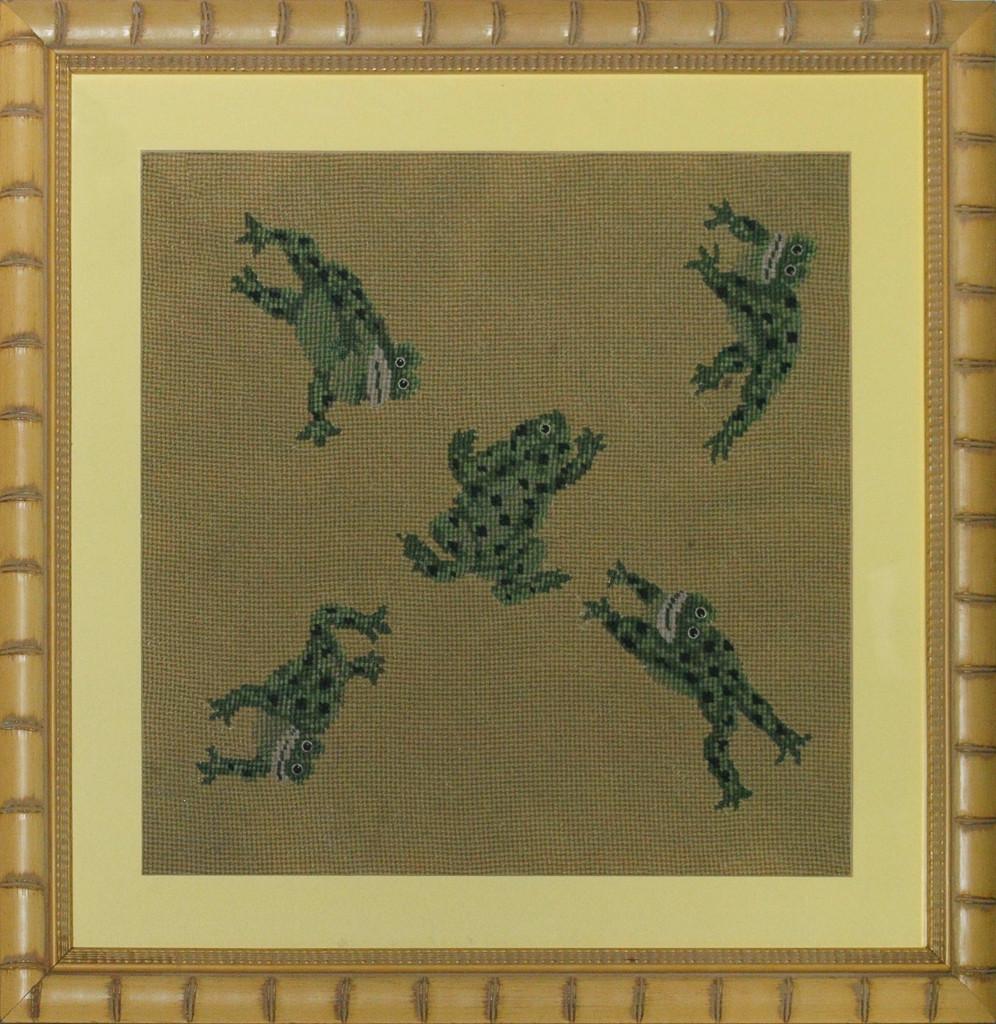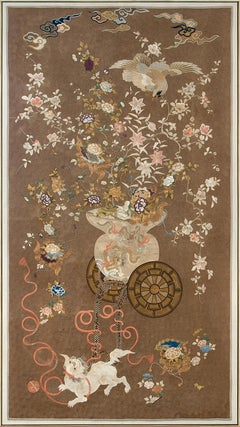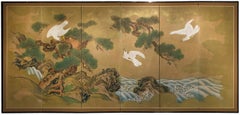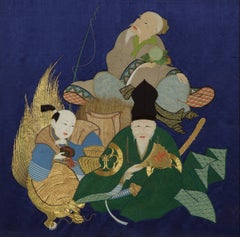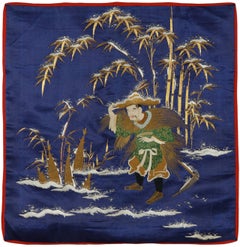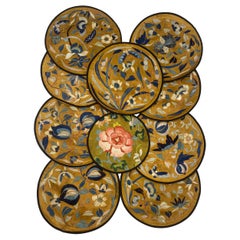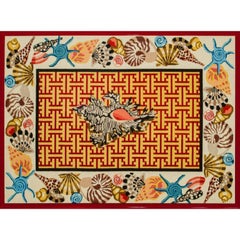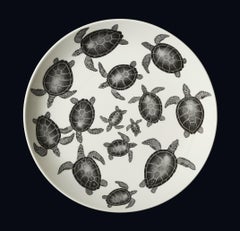Want more images or videos?
Request additional images or videos from the seller
1 of 5
UnknownEmbroidered Roundels of Turtles
$3,700
£2,763.72
€3,204.10
CA$5,137.36
A$5,758.32
CHF 2,998.19
MX$70,311.51
NOK 38,066.07
SEK 36,083.21
DKK 23,906.03
Shipping
Retrieving quote...The 1stDibs Promise:
Authenticity Guarantee,
Money-Back Guarantee,
24-Hour Cancellation
About the Item
A silk and gold thread embroidery of titles. Japan's textile industry was one of the first to adopt Western science and technology, and thus the Meiji era produced some of the highest quality silk textiles. The engravings of oil paintings inspired the embroideries, with the artist of the painting and the artist at the textile factory maintaining a close relationship. Japanese embroidery technique goes back more than one thousand years. It originated in China and was eventually introduced to Japan by Korean artisans; around the same time Buddhism entered Japan. In Japan, colored silks were embroidered with long soft stitches in untwisted silk threads. Flowers, birds, bold flowing lines, and abstract motifs are common in Japanese textiles, and the designs achieve a feeling of calm restraint through their spacious distribution. Also characteristic of Japanese textiles is the use of gold and silver thread. The Japanese developed a special method of creating metal threads, in which a layer of gold or silver was deposited on to rice paper, which was then cut into fine strips and wrapped around a thread core.
- Dimensions:Height: 21 in (53.34 cm)Width: 32 in (81.28 cm)
- Medium:
- Period:
- Condition:
- Gallery Location:Palm Desert, CA
- Reference Number:Seller: 21381stDibs: G1112199344
About the Seller
4.8
Recognized Seller
These prestigious sellers are industry leaders and represent the highest echelon for item quality and design.
Established in 1996
1stDibs seller since 2011
112 sales on 1stDibs
Typical response time: 3 hours
- ShippingRetrieving quote...Shipping from: Palm Desert, CA
- Return Policy
Authenticity Guarantee
In the unlikely event there’s an issue with an item’s authenticity, contact us within 1 year for a full refund. DetailsMoney-Back Guarantee
If your item is not as described, is damaged in transit, or does not arrive, contact us within 7 days for a full refund. Details24-Hour Cancellation
You have a 24-hour grace period in which to reconsider your purchase, with no questions asked.Vetted Professional Sellers
Our world-class sellers must adhere to strict standards for service and quality, maintaining the integrity of our listings.Price-Match Guarantee
If you find that a seller listed the same item for a lower price elsewhere, we’ll match it.Trusted Global Delivery
Our best-in-class carrier network provides specialized shipping options worldwide, including custom delivery.More From This Seller
View AllDog and Wagon Embroidery, Japan
Located in Palm Desert, CA
A Japanese Embroidery featuring a dog and wagon, silk and gold thread embroidery by an unknown artist from c. 1890. The artwork is unsigned. Provenance: Private Collection, Los Angeles; Heather James...
Category
Late 19th Century Tribal More Art
Materials
Silk
6 Panel Japanese Byobu
Located in Palm Desert, CA
A Japanese screen. A six panel, Japanese Byobu screen depicting white birds perched in a pine tree and flying over a flowing river.
Provenance:
...
Category
19th Century Other Art Style Landscape Paintings
Materials
Paper, Pigment
Three Old Men/Japanese Fukusa
Located in Palm Desert, CA
Japanese Fukusa
Silk embroidery and gold thread
Category
17th Century More Art
Materials
Silk
Dutiful Son/Japanese Fukusa
Located in Palm Desert, CA
Japanese Fukusa
Silk embroidery with gold thread
Category
19th Century More Art
Materials
Silk
Fukusa, Pair of Lobsters
Located in Palm Desert, CA
A silk embroidery by an unknown Japanese artist. “Fukusa, Pair of Lobsters” is from the Meiji Period and in golds and blues. The artwork is unsigned.
Provenance:
Private Collection, Palm Springs
Heather James Fine Art, Palm Desert
Category
Late 19th Century Tribal More Art
Materials
Silk
6 Panel Japanese Byobu, Japan, Meiji/Taisho Period (Early 20th Century)
Located in Palm Desert, CA
A six panel Japanese Byobu in gold and green, paint on paper and wood by an unknown artist from the Meigi or Taisho peiord. The artwork is unsigned. Provenance: Private Collection
Heather James Fine Art...
Category
19th Century Tribal Landscape Paintings
Materials
Paint
You May Also Like
Needlepoint Shells
Located in Bristol, CT
Hand-needlepoint c1960s panel w/ three seashells & a coral branch
Art Sz: 14 1/2"H x 14 1/2"W
Frame Sz: 21 1/2"H x 21 1/4"W
w/ bamboo frame
Category
Mid-19th Century Other Art Style More Art
Materials
Wool
10 Antique Chinese Embroidered Silk Roundels
Located in Brea, CA
10 antique Qing Dynasty Chinese embroidered silk roundels embroidery robe. Decorated all-over with beautiful blue and red flowers. 9 pieces: 9 in diameter....
Category
Antique Late 19th Century Chinese Qing Antiquities
Materials
Silk
Needlepoint Seashells
Located in Bristol, CT
Colourful hand-needlepoint c1960s panel depicting (48) shells surrounding a red & yellow Chinoiserie maze with a 15"W shell at centre, in a Chinese red laquer...
Category
Mid-20th Century Other Art Style More Art
Materials
Other Medium
Turtle traffic
By Tom Rooth
Located in London, GB
with signature (on a turtle swimming in the opposite direction), and the artist's thumbprint (on the reverse)
screen print on earthenware, with underglaze paint
37 cm. (14 ½ ) diam...
Category
2010s Realist More Art
Materials
Ceramic
Embroidered roundel with Buddhist symbols, Qing Dynasty
Located in Atlanta, GA
This medallion, which would have been sewn on a robe, depicts a number of symbols on a background of light and dark blue clouds. The central symbol is Fu, which represents the power ...
Category
Antique Early 19th Century Chinese Textiles
Materials
Silk
"Five Leaping Frogs" Hand-Needlepoint Framed Panel
Located in Bristol, CT
Hand-needlepoint c1960s canvas depicting five leaping frogs
Art Sz: 14 1/2"H x 14 1/2"W
Frame Sz: 20 1/2"H x 20 1/2"W
Category
1960s More Art
Materials
Wool
More Ways To Browse
Antique Roundel
Antique Turtle
Turtle Art
Gold Turtle
Antique Embroidered Gold
Japanese Embroidery
Gold Thread Embroidery
Korean Silk
Antique Japanese Textiles
Embroidered Birds
Japanese Embroidered
Silk Gold Thread Embroidery
Silver Turtle
Japanese Silk Embroidered
Japanese Silk Painting Bird
Metal Turtle
19th Century Chinese Painting On Silk
Japanese Silk Paintings Of Birds
